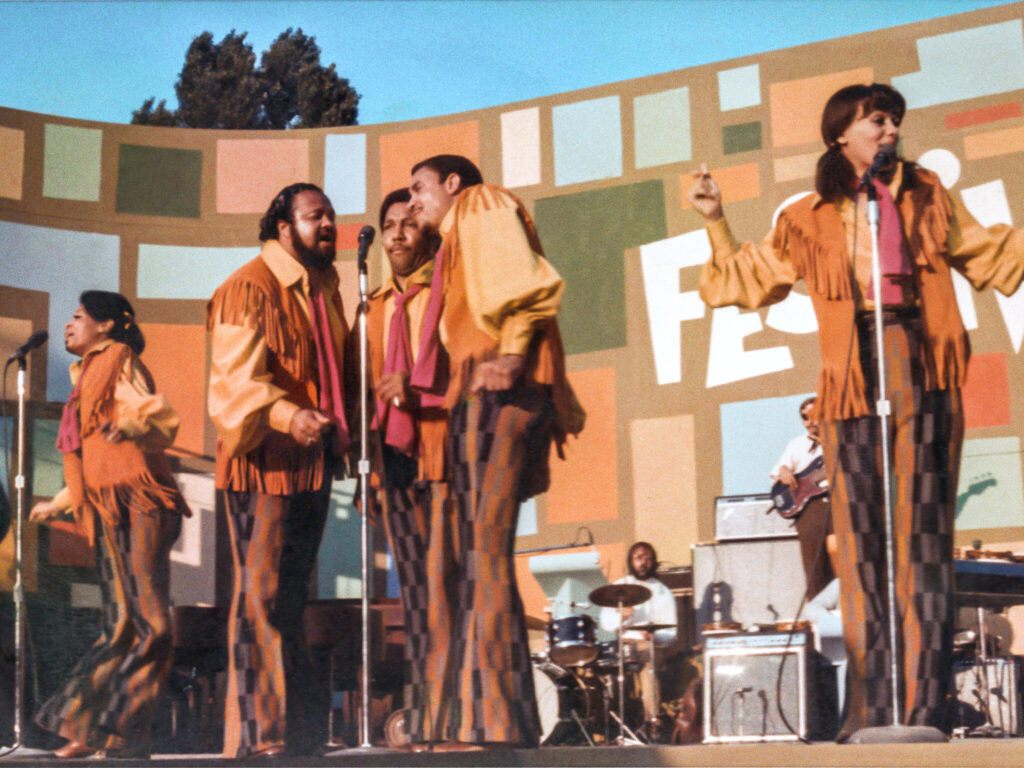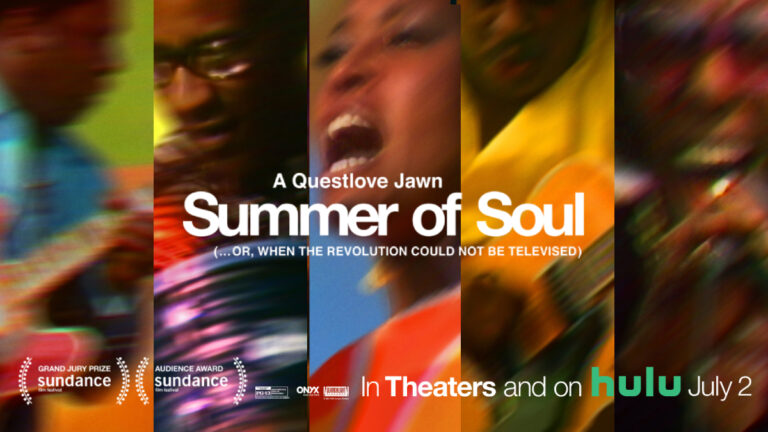Oscar Nominations:
Documentary Feature (WINNER)
Summer of Soul is rated by both general audiences and the critical community as the best movie, not just among the group of documentaries (it won the Oscar – see FLEE, the only other reviewed documentary from this year), but across all thirty-eight nominated films this year. Although I’m not quite prepared to put it at the absolute top – at least not yet – I will say that this is a must-see movie. Even if you are not a fan of documentary films, if you have any affection for the music of the late 60s, you will want to watch Summer of Soul. And even if you aren’t a fan of my generation’s music, you might enjoy watching this entertaining, and educational movie.
The movie is a labor of love from Questlove, or, as he is officially known, Amir Thompson. Questlove is an accomplished musician and writer in his own right, with a discography including rap, soul, and jazz. He also founded the band Roots and he and that group are the studio band for Jimmy Fallon’s Tonight Show. Questlove has voiced characters in animated films and collaborated with Michelle Obama on a book. Summer of Soul is, however, his debut as a feature film director but if this is any indication of his filmmaking talents, it won’t be his last cinematic effort.
But let’s get a few things straight – Questlove didn’t film most of this movie; in fact, he wasn’t born until two years after the events in this movie. Instead, the great bulk of the film was actually found footage – some 40 hours of film that had been sitting in the basement of Hal Tulchin. Tulchin had been the person responsible for recording the six concerts of the 1969 Harlem Cultural Festival, which took place over six Sundays that summer in a relatively small park (then known as Mount Morris Park, now Marcus Garvey Park) in the middle of Harlem, New York City. For at least part of the series, the Black Panthers provided the security as the New York City Police weren’t eager to be in attendance. The concerts were free, sponsored by Maxwell House Coffee and put on by local organizer and lounge singer Tony Lawrence who worked with the New York City parks department and Mayor John V. Lindsay to put on the series. Each week covered a different kind of music ranging from Soul to Gospel to Blues, Caribbean and Jazz. And, apparently, each week the park bulged with local patrons for a total attendance estimated at more than 300,000.
For a while, the concert was promoted as the Black Woodstock, mimicking the more famous concert that was held just one weekend in a town 100 miles upstate that same summer. But Black Woodstock, like so many beautiful things in black culture, did not resonate with the world like the hippy-fest further north. Although the concert was featured in a brief broadcast on a local TV station, Tulchin tried for years to turn his film footage into a concert video, but no-one thought it was worth the effort…until Questlove found it after nearly fifty years. Frankly, it is amazing that the video and sound recordings have survived as well as they did.
The concert footage is the core of this film and is the main reason to watch it. The assemblage of black musical talent is nothing short of amazing. Remember that this is 1969 when many of these performers were already hit recording artists and so being able to attract them to perform on a hot summer stage in the middle of Harlem, for probably a piddling sum of money, has to be considered a testament to how valuable they believed the venue was and how important it was that they be there. I assembled a list of performers that number two dozen – and these were just the performers captured in the film. The list includes names like Stevie Wonder, The Chambers Brothers, B.B. King, Herbie Mann, the 5th Dimension, Mahalia Jackson, the Staple Singers, David Ruffin, Gladys Knight & the Pips, Max Roach, Hugh Masekela, Nina Simone, and Sly and the Family Stone. It is difficult to be a child of the 60s and not have one or more of these names on your playlist, even today. And their songs are the top hits, too, performed with energy and belief – the performances, one after another, are nothing short of miraculous.
All of them were good, but some were great. There is a gospel duet with Mavis Staples and Mahalia Jackson (not planned before the concert) that, even if you aren’t into gospel, ranks as an amazing partnership of two incredible voices. The 5th Dimension does a wonderful version of Aquarius/Let the Sunshine In that was their attempt to reaffirm their roots in the Black community. Gladys Knight and the Pips do I Heard it Through the Grapevine, and David Ruffin (formerly with the Temptations) does a stylistic interpretation of My Girl that will blow your socks off. (My roommates and I used to play that song repeatedly in college over the next four years!). Simply put, the music never stops.
The Summer of Soul, though, is so much more. It isn’t just a replay of found concert footage. What Questlove did is find many of these artists, political figures, and attendees that were there at the concerts, brought them to his studio and set them down to watch these sequences. None of them had ever seen this footage before and then, suddenly, they were seeing themselves 50 years ago. Marilyn McCoo – still gorgeous as ever – breaks into tears seeing herself fifty years younger, having the time of her life. She and Billy Davis Jr. tell the story of how they originally came to record Aquarius/Let the Sunshine In, an interesting and fun story. Jesse Jackson tells how the very last words from Martin Luther King Jr. were that he wanted to hear Precious Lord, which is the song that Mahalia Jackson and Mavis Staples sing so movingly. Gladys Knight recounts that “It wasn’t just about the music. We wanted progress and we want our people lifting us up.” An attendee remarked that before the concerts he was a suit and tie man (e.g. Motown groups), but after watching Sly and the Family Stone, he no longer required the suits. Lin Manuel-Miranda and his father talked about how Latin/Caribbean music was very much a part of the culture and Hugh Masakela sought to expand the black struggle around the world, bringing in references to South Africa.
Don’t worry, though – the talking heads never outshine the music. In fact, frequently, their words are fading out as the music fades in. Questlove seems to achieve a near-perfect balance between musical entertainment and a good smattering of informational tidbits that add just enough to enhance your enjoyment – you learn while you have fun.
Inevitably, as there must always be with messages regarding the Black experience, there is a political message here as well. There is a sequence of interviews with concert attendees about the significance of the first moon landing – which actually occurred during one of the concerts. While whites were exuberant about the event, the blacks shrugged – why, they asked, if we can put a man on the moon, do so many people need help here on Earth? It is a decent question and one without a good answer.
The movie also does a great job, using other film footage, of establishing the context. 1969 was, for sure, the year after the infamous 1968 – and that year will go down in history as one terrible event after another. So the politics of the late 60s is not ignored. New York Times reporter, Charlayne Hunter-Gault relates how she was responsible for changing the Times editorial policy that year from calling things ‘Negro’ to labeling them the way the community itself identified – as Black. Assassinations, riots, and war set the violent stage for so much of politics in the ensuing years. In fact, I think I would argue that we still haven’t seen the end of those effects as they continue to play out in today’s contorted and threatening world.
So, yes, there is so much in Summer of Soul. You will enjoy the music and the energy and you will learn so much too. You won’t like everything you see or hear, but you will have an amazing two hour trip through the Black Culture of 1969. Enjoy. (4.5*)
Stream on Hulu or Disney+ and rent it from multiple platforms, NetflixDVD, or wherever you get your discs



2 thoughts on “Summer of Soul”
I think the quality of the film is amazing given the basement storage history of the film.
We saw it at movie night at Red Rocks amphitheater on the edge of Denver this summer. A big screen, with a great sound system, a warm summer evening, city lights and stars was a perfect venue for this movie.
I was a young hippy-looking long hair hitchhiking around the country with a big army rucksack the next summer after the concert, and I walked through that little park with a swarm of black youngsters pestering me with questions and showing me down the street a way how to unscrew the fire hydrant covers to get the water flowing.
It was a genuinely rough time in some ways but it didn’t overall feel as fundamentally threatening as current events.
Thx